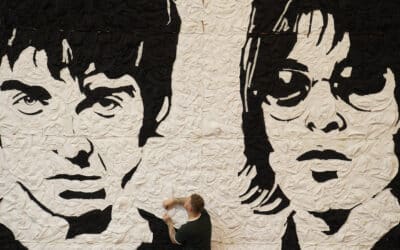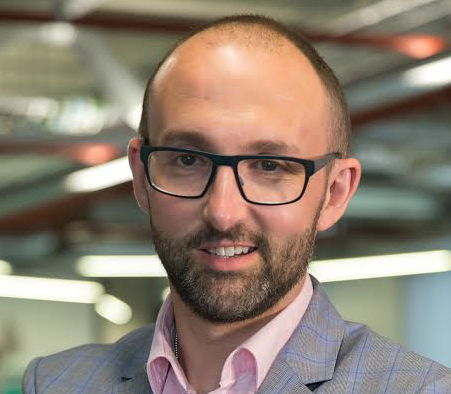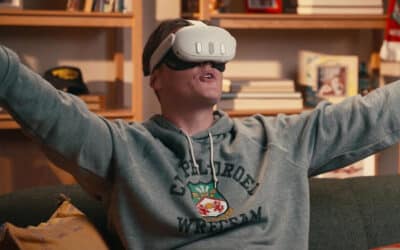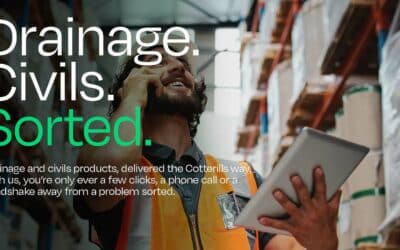It’s been another 12 months of whirlwind change across the creative sectors of the North. But what about 2016?
We asked a selection of senior figures from across our industry to give their thoughts on what the next big thing in their sector will be.
A big thank you to all those who have contributed.
 ‘The year when content wins over data’
‘The year when content wins over data’
Jason Spencer, Business Development Director, ITV
2016 will be the year when content wins the argument over data, and effectiveness trumps efficiency. Big live shared TV experiences will continue to be the fuel for powerful connected marketing campaigns, feeding search, social media and beyond. “Positive wastage” will be an aspiration not an abhorrence, as brands try to reach and influence new customers, rather than just optimize the ones who they already talk to. At ITV, we are putting our money where our mouth is to help brands thrive in new ways including:
1. Over £1bn in premium original content (with lots more invested in production companies too)
2. ITV Hub (where “live” viewing is rivalling catch-up for the first time ever)
3. Connected campaigns (where our partnership with RadiumOne will enable you to synchronise TV spots and online)
4. Short-form content production (where our new AdVentures business will help you to extend the activation of campaigns beyond the spot)
As a result, brands and agencies will get more opportunities to work with media owners more as marketing partners, driving even more effective brand partnerships.
 ‘The year of 4K… or will we go straight to 8k?’
‘The year of 4K… or will we go straight to 8k?’
Jonathan Ashworth, Creative Director, Mighty Giant
Is 2016 the year of 4k screens or will we skip 4k and move production straight to 8k? We saw something similar in our broadcast and advertising work during the shift from SD to HD.
Broadcasters looking forward wanted graphics and animations produced to a higher resolution than they currently needed. ‘Future proofing’ to 8k may be an unnecessary burden on those at the production end. The costs of upgrading and speeding up the processing power required to produce the work to an 8k specification will incur a cost. A cost that not only could end up prohibitive to the content maker but also unnecessary.
This chase to the highest amount of pixels possible seems to be driven by the screen manufacturers rather than what the human eye can actually handle. We at Mighty Giant love a big shiny screen. How big that screen becomes in 2016 is up for debate.
 ‘Digital technology will be put into the hands of the patient’
‘Digital technology will be put into the hands of the patient’
Lu Rahman, Founder, DigitalHealthAge.com
2016 will be a key year for the digital health sector – and the beginning of a healthcare revolution in the UK that will start with our ability to digitally access our own health records.
Whether it’s booking an appointment, seeing a doctor or getting a prescription – digital technology will be put into the hands of the patient improving our relationship with GPs. It will give us more channels to ensure we get the best advice, care and treatment for both short and long term conditions.
Doubly exciting about this is the North West’s pivotal role in ensuring its success. The region boasts world-class expertise, academic research and infrastructure. Leading health
organisations have made the North West their base, being praised by David Cameron for showing ‘great collaboration between scientists and businesses’.
 ‘Trends should be footnotes to the creative’
‘Trends should be footnotes to the creative’
Anthony Hartley-Denton, Managing Director, Mi
In the last half of 2015 we’ve seen the market bullish and a little unfocused. The impatience to be an early adopter often subjugates the creative idea to the tech which delivers it.
For us, next year will see us continue to pare back and simplify creative strategy for clients. In-sector “trends” and “developments” should be footnotes to the creative story. The games industry operates exclusively with this mandate which is why it weathers most economic cycles. We should realise that early tech adoption with no narrative just commoditises services.
 ‘Brands must start to understand what makes their audience tick’
‘Brands must start to understand what makes their audience tick’
Rob Shaw, CEO, Jaywing UK & Australia
For me next year is all about Big Data, actionable insight. Customer engagement and experience will be a key aim for 2016, but brands will find it impossible to communicate effectively to their audience without understanding what makes them tick. This will come from careful analysis and application of customer data. This has been on marketers’ radar for a while, yet too many are still simply gathering and viewing masses of data but not making effective and proactive use of it.
The brands that will succeed will be the ones that deliver marketing communications based on actionable insight, and that are also prepared to engage with consumers in real-time; talking to them whenever and wherever they are.
 ‘We’ll start to make digital more human’
‘We’ll start to make digital more human’
Louis Georgiou, Managing Director, Code Computerlove
I see the next wave of change less about digital replacing the physical, but digital with physical becoming a greater than the sum of their parts.
As we see innovation in smart phones, tablets and even smart watches slowing down (yes, let’s face it, the Apple Watch is really a mini iPhone on a wrist strap with a tweaked interface) there’s suddenly a shift of interest to other wearable technology and ‘internet of things’ home technology.
2016 heralds the explosion of maximising the interactive potential of ‘everything’ that will make it work that much harder. In a way we’re making digital more human.
One of my favourites is Amazon Dash. It’s just a tiny physical button that you attach to your washing machine and press to order powder when you run out, or attach one to your loo roll holder to order more paper when you’re stuck.
 ‘The line between on demand and TV will vanish completely’
‘The line between on demand and TV will vanish completely’
Dan Whitehead, Head of Drama and Digital, K7 Media
2016 will be the year that the already blurred line between SVOD (subscription video on demand) and traditional TV vanishes completely. The likes of Netflix and Amazon are now well established as leading commissioners of high end drama, and are moving into new territories to serve the whole world. Viewing on demand has become normalised, with the result that the old sales cycle that puts linear broadcast first is already outdated.
We’re going to see more shows split their launch between SVOD and linear in different countries, and even more shows launching digitally first before airing on “normal” television. And with the imminent launch of Amazon’s Top Gear rival, the trend is no longer unique to scripted shows. Content has become truly platform agnostic.
 ‘This year will be another shot in the arm for digital radio listening’
‘This year will be another shot in the arm for digital radio listening’
Jonathan Wall, Controller of BBC Radio 5 live and 5 live Sports Extra
The huge sports events Euro 2016 and Olympics will help give speech radio a really strong year. The former, with so many home nations involved, will create great talking points, and the latter in Rio, falls well for radio. So many big live events will be in the middle of the night, so we anticipate big opportunities at breakfast time to catch up.
This is also a year of unprecedented choice for listeners with lots of new digital channels emerging over the next few months. Competition is going to be more intense than ever, but crucially, along with the rapidly increasing numbers of DAB radios in new cars, it will be another shot in the arm for digital radio listening. And online listening to both live radio and short best bits will become more prevalent. Radio bosses up and down the UK will be looking for the next wave of star presenters to make their stations stand-out in an even more competitive market.
 ‘Drones will continue to change the way producers and directors work’
‘Drones will continue to change the way producers and directors work’
Andrew Sheldon, Creative Director, True North
In 2016 television production will be all about 3D – but don’t worry, there’s no need for dodgy specs.
Diversity will be at the heart of things. In the North it presents a different set of challenges to the larger and more flexible workforce in London, and needs creativity and initiative to make sure we don’t just tick the boxes, but exceed them.
Devolution will be a cause of huge debate as demand grows from the Nations for ever larger guarantees of production spend, at the expense of the less politically fashionable North. In the run up to Charter Renewal, the BBC could show a commitment to production in great regional cities like Newcastle, Bradford, Hull, Sheffield and Nottingham as well as Glasgow, Cardiff and Belfast.
Finally, Drones will continue to change the way producers and directors work, with more operators using ever more sophisticated machines to bring camera shots that were previously unachievable to the screen.
So, Diversity, Devolution and Drones – 3Ds that will make their mark in the coming year.
 ‘The arrival of object-based audio’
‘The arrival of object-based audio’
Tony Greenwood, Managing Director, Core Post
At Core we think the biggest changes next year will be the arrival of 4K video in the home. Many broadcasters are working on delivery methods and programme makers are now asking us to quote to produce their programme in 4K. But it could be a close run race, with HDR (High Dynamic Range) video. HDR offers a much bigger wow factor to the consumer and is of interest to broadcasters as it can be applied to their back catalogues. HDR televisions are due to be in the shops early next year. We will have to wait and see which one will be the winner.
The next challenge for Core’s audio team could be the arrival of object-based audio, which will deliver a more immersive experience to the viewer. It will also allow the sound mix to be altered to match the playback system through the use of metadata, so if the sound is played on a tablet the audio is adjusted to make it sound as good as possible or if played on a good HiFi system you can get the full benefit of the sound mix. For people with hearing difficulties they may also be able to adjust the level of music or background sounds.
We are still waiting for the standards to be published for all of these but we expect them to be out very soon.
 ‘A growing interest in a regional perspective on political and social affairs’
‘A growing interest in a regional perspective on political and social affairs’
Kevin Gopal, Editor, The Big Issue In The North
I wonder if next year will see a further weakening of the London print media’s hold on the political agenda.
The Westminster-focused commentariat got it wrong on the general election, Corbyn, and the Oldham West and Royton by-election, and that, it seems to me, was partly down to not getting out of London enough.
I think there will be growing reader interest in well-informed editorial about political and social affairs from a regional perspective. Our readers liked our general election coverage, when we visited Lancaster and Fleetwood, Great Grimsby, Thirsk and Malton, Burnley and Sheffield Hallam. Analysis of the so-called Northern Powerhouse also drew a strong response, as did features on fracking and benefit sanctions. And sales of the magazine have gone up.
We’re planning on more reporting in a similar vein. It’s encouraging the Guardian is staffing up in the north, and Andy Bounds at the FT continues to unearth good stories. More of it, I say.
‘Virtual Reality is set to become more prevalent’
Chris Broadbent, MD, MediaCom Leeds
2016 will be the year when the media and advertising industries further embrace and unlock the power of emerging technology, harnessing machines in ways that will change the way we approach campaigns and connect with consumers.
Importantly though, as an industry our focus must be on applying technologies that mirror and support human behavior, rather than requiring consumers to change their behaviors to keep up with technology.
One example of this will be the proliferation of Virtual Reality, set to become more prevalent in the year ahead. Once through the hype cycle, VR will need to battle its way through the trial barrier, the behaviour barrier and the content barrier to achieve mass consumer adoption. But if these hurdles can be overcome, there are all manner of tantalising opportunities for advertisers and their agencies waiting in the year ahead.
 ‘A long tail keyword strategy will become increasingly vital’
‘A long tail keyword strategy will become increasingly vital’
Matt Bullas, CEO & Founder, Click Consult
High proportions of search queries will be using Google’s rich answers in 2016 (like Google’s Knowledge Graph), and businesses will need to tailor their content to their audience’s needs more than ever before and shift away from generic content towards specific, relevant information that anticipates and satisfies detailed user searches.
This will mean a focus on long tail keyword strategy, which will become increasingly vital. Related to this will be a trend towards conversational search, driven by voice activation and something else content creators need to take into account. As Google gets smarter in 2016, businesses will need to follow suit.
 ‘There will be greater collaboration between the teams required to build engaging content’
‘There will be greater collaboration between the teams required to build engaging content’
Matthew Williams, Managing Director, Quba
The emphasis on strategies that deliver quality content will continue to be high on the agenda.
2016 will see a blurring of the lines between content generated by website teams (via content management systems) and that which is created by content marketing and SEO teams.
Greater collaboration between teams (creative, search, technical) will be required to build engaging content that achieves specific goals eg building brand equity, driving search traffic, generating inbound links.
Content creators will need to focus on personas and what they are trying to achieve at each stage of the customer journey, and what we as digital people (from all disciplines) can do to help them achieve their goals.
 ‘The pipeline of industry-ready talent will help creative businesses’
‘The pipeline of industry-ready talent will help creative businesses’
Sue McHugh, Managing Director, Carbon Digital
I believe that we will see a significant shift between the move from formal study to the workplace. This September saw the launch of the shiny new UTC@MediaCityUK. The facility is based right in the heart of Media City, set amidst the surrounding studios and post-houses. With an open-door ethos the students are already working with local businesses, working on live projects away from the classroom desk.
Students are being exposed to a risk-based environment and are already launching their own ventures, the pipeline of talent feels very different. I believe that the industry ready talent coming through is of huge importance to creative businesses. I hope we will see more tech innovation and creative application from young students and graduates, which will inject fresh ideas and push boundaries.





 ‘The year when content wins over data’
‘The year when content wins over data’ ‘The year of 4K… or will we go straight to 8k?’
‘The year of 4K… or will we go straight to 8k?’ ‘Digital technology will be put into the hands of the patient’
‘Digital technology will be put into the hands of the patient’ ‘Trends should be footnotes to the creative’
‘Trends should be footnotes to the creative’ ‘Brands must start to understand what makes their audience tick’
‘Brands must start to understand what makes their audience tick’ ‘We’ll start to make digital more human’
‘We’ll start to make digital more human’ ‘The line between on demand and TV will vanish completely’
‘The line between on demand and TV will vanish completely’ ‘This year will be another shot in the arm for digital radio listening’
‘This year will be another shot in the arm for digital radio listening’ ‘Drones will continue to change the way producers and directors work’
‘Drones will continue to change the way producers and directors work’ ‘The arrival of object-based audio’
‘The arrival of object-based audio’ ‘A growing interest in a regional perspective on political and social affairs’
‘A growing interest in a regional perspective on political and social affairs’
 ‘A long tail keyword strategy will become increasingly vital’
‘A long tail keyword strategy will become increasingly vital’ ‘There will be greater collaboration between the teams required to build engaging content’
‘There will be greater collaboration between the teams required to build engaging content’ ‘The pipeline of industry-ready talent will help creative businesses’
‘The pipeline of industry-ready talent will help creative businesses’





